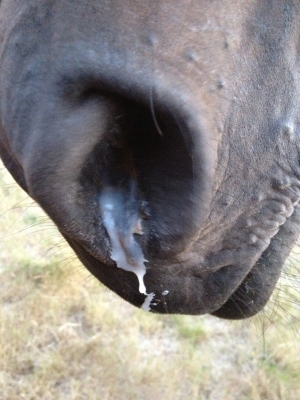
Strangles is caused by a bacteria called Streptococcus equisubspecies equi. It occurs worldwide and is very contagious. The disease is called strangles because the swollen glands can squash the airway and make it difficult for the horse to breath.
The severity of the disease can vary, some animals may show virtually no signs, some may be a bit depressed for a few days and others will show more classic symptoms.
Most horses that have recovered from strangles are immune for up to 5 years, however immunity is not life long.
Transmission of strangles
- Direct contact with nasal discharge or pus from ruptured abscesses in infected horses
- Exposure to contaminated buckets, halters, leads, brushes, clothing, fences, stables, horsefloats, people etc.
Once a horse has recovered they may still shed the bacteria for several weeks. The bacteria will also survive in the environment, especially during colder months for 4-8 weeks.
The bacteria is killed by disinfectants such as: Betadine, Chlorhexidine and Vircon.
Incubation period
2 to 10 days – most horses show signs within 2-10 days, some animals don’t show signs for up to 3 weeks.
Signs/Symptoms
- Depressed
- Fever (a horse’s normal temperature range is 37.00C – 38.50C) any temperature over 38.80C is definitely a fever, a temperature between 38.50C and 38.80C is suspect.
- Clear, watery nasal discharge that becomes thicker and yellow
- Swelling of glands under the chin and behind the jaw/throat latch area
- Head and neck stretched out, trouble swallowing, making a noise when breathing, coughing.
If your horse is exhibiting these symptoms please contact your veterinarian.
Prevention / Control
Minimise spread of disease
- Isolate infected horses from healthy horses on the property
- Where possible people should avoid going from the affected property to another horse property
- Anyone leaving the property to go to another horse property could potentially spread strangles. They should go home, wash, change their clothes and disinfect their boots or wear another pair of boots before going near any other horses.
- Any new arrivals to the infected property should be isolated from other horses for 2 weeks to assess whether they carry any infection and to prevent them from giving it to resident horses on the property.
- Minimise/abolish horses leaving the property to mix with other horses (going for a lesson, to a show, or pony club) as they may infect these properties too. Ideally the returning horse should be isolated as much as possible and have its temperature taken twice a day for at least a week. If there is any increase in temperature the horse should be treated as a suspect infected animal and fully isolated.
- Equipment such as buckets, feed bins, halters, brushes should not be shared between horses. If these items have been exposed to an infected horse they should be disinfected.
- If a horse owner has an infected horse and a non-infected horse they should visit/feed their healthy horse first and then attend to the sick horse. After attending the sick horse they should wash, change their clothes/shoes, before coming into contact with any other horses.
Vaccination
None of the vaccines guarantee prevention of strangles, they may prevent disease or reduce the severity of disease. It takes at least 2 weeks for the immune system to develop a protective response to vaccination.
Vaccinating a horse that is carrying strangles can cause serious complications and should be avoided.
In the event of an outbreak of strangles, horses can be segregated into three groups and handled as follows
- Those affected by the disease should not be vaccinated
- Horses with no known contact with the disease can be vaccinated immediately
- Horses known to have been in contact should be observed for 21 days and vaccinated only if they have a normal temperature and show no clinical signs of the disease.


